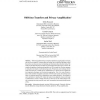Free Online Productivity Tools
i2Speak
i2Symbol
i2OCR
iTex2Img
iWeb2Print
iWeb2Shot
i2Type
iPdf2Split
iPdf2Merge
i2Bopomofo
i2Arabic
i2Style
i2Image
i2PDF
iLatex2Rtf
Sci2ools
107
click to vote
EUROCRYPT
1997
Springer
1997
Springer
Oblivious Transfers and Privacy Amplification
Oblivious transfer (OT) is an important primitive in cryptography. In chosen one-out-of-two string OT, a sender offers two strings, one of which the other party, called the receiver, can choose to read, not learning any information about the other string. The sender on the other hand does not obtain any information about the receiver's choice. We consider the problem of reducing this primitive to OT for single bits. Previous attempts to doing this were based on self-intersecting codes. We present a new technique for the same task, based on so-called privacy amplification. It is shown that our method has two important advantages over the previous approaches. First, it is more efficient in terms of the number of required realizations of bit OT, and second, the technique even allows for reducing string OT to (apparently) much weaker primitives. An example of such a primitive is universal OT, where the receiver can adaptively choose what type of information he wants to obtain about th...
Related Content
| Added | 25 Aug 2010 |
| Updated | 25 Aug 2010 |
| Type | Conference |
| Year | 1997 |
| Where | EUROCRYPT |
| Authors | Gilles Brassard, Claude Crépeau |
Comments (0)

